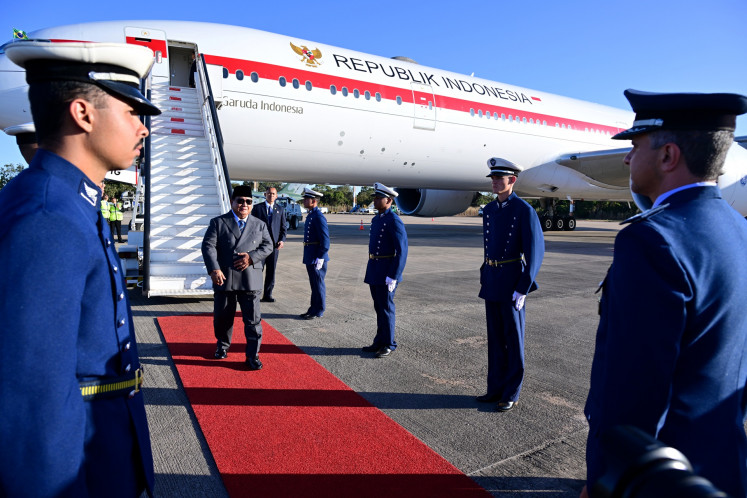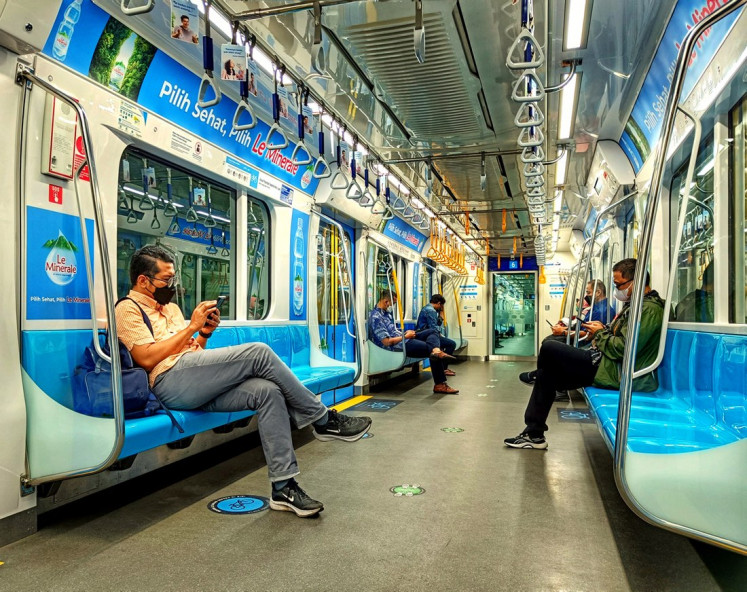Popular Reads
Top Results
Can't find what you're looking for?
View all search resultsPopular Reads
Top Results
Can't find what you're looking for?
View all search results9/11 attacks bring US, RI closer
On Sunday, the world will mark the 10th anniversary of the most lethal attack on US soil since Pearl Harbor
Change text size
Gift Premium Articles
to Anyone
O
n Sunday, the world will mark the 10th anniversary of the most lethal attack on US soil since Pearl Harbor. The Jakarta Post is commemorating 9/11 with a special report on the Indonesian perspective of the attacks and their aftermath.
No more violence: In this file photo, members of Hizbut Tahir Indonesia stage a protest against the US’ plan to invade Iraq in March 2003. JP/Arief SuhardimanMaking a previously planned visit to Washington on Sept. 20, 2001, then president Megawati Soekarnoputri, who just weeks before had assumed office, became the second international leader — and the first from a Muslim-majority country — to meet George W. Bush after the 9/11 terrorist attacks.
Megawati condemned the attacks and vowed to work with the international community to combat terrorism. Bush welcomed Megawati’s support, pledged additional funding for Indonesia and pressed for peaceful resolution of separatist conflicts while reiterating US support for Indonesia’s territorial integrity.
The US designation of Southeast Asia as a “second front” in the “war on terror” following Jamaah Islamiyah’s foiled attack in Singapore in December 2001, and loud, public demands that Indonesia’s terrorist crackdown had created tensions.
It was not until the first Bali bombing killed 202 people — one year, one month and one day after 9/11 — that Indonesia became serious about terrorist threats.
After that, there was no turning back for US-Indonesian relations, with Bush lauding Indonesia as an ally in fighting terrorism.
Many said Indonesia’s shift from a potential problem to a partner in the “war on terror” provided the basis for the US rapprochement.
Since then, much US aid and attention have poured into Indonesia, with local experts agreeing that the relations between the countries have continued to improve, at least at the governmental level.
“The relationship at the government level is doing well … but what needs to be addressed are suspicions among Muslims that Bush was targeting them with his military operations [in the Middle East]. These suspicions persist even today,” University of Indonesia international relations expert Hariyadi Wirawan told The Jakarta Post on Thursday.
Dewi Fortuna Anwar, an advisor to Vice President Beodiono, agreed that Jakarta continued to cooperate with the Bush administration on security.
“In terms of public perception, there was a lot of unhappiness directed toward the US, which, in turn, constrained relations because any policy that was deemed as too close to the US was instantly criticized by the public and media,” she said.
“[US President Barack] Obama changed the direction of foreign policy again to become more multilateral and consultative. That, in combination with his close historical connections with Indonesia, have resulted in Indonesian-US relations reaching their peak.”
Hariyadi said there were different approaches evinced by the US toward Indonesia under Bush’s and Obama’s administrations.
As an African-American with a Muslim biological father, Obama concluded that misconceptions between Muslims and US people had to stop, he said.
The 9/11 attacks on the World Trade Center in New York and the Pentagon in Washington, DC, reportedly killed more than 3,000 people.
The attacks set off a chain of events that led the US into wars in Afghanistan and then Iraq. The US’ intelligence apparatus was overhauled to counter the threat of terror attacks at home.
Hariyadi said most Muslims in Indonesia believed that the West started the war and continued to support Israel’s aggression toward Palestine, while people in the West always associated Islam with terrorism.
“There’s a perception in the West that Islam is dangerous. They don’t see that most Islamic groups do not want to be involved in any violence,” he said.
“It needs a lot of bold steps from Obama to explain [to Indonesians] how both countries can contribute to the development of people, not only here or in Asia or Africa, but also in [other parts of] the world.”
Indonesia Defense University international relations expert Bantarto Bandoro said terrorism was the common thread that had united Indonesia and the US over the last 10 years.
“I think Obama also wants to position the US in a place that is acceptable to the Islamic world. He is using Indonesia as the medium to build that image,” he told the Post.
He said there had to be NGOs that could help the Indonesian government build a good domestic perception of the US, while at the same time the Indonesian government had to work on removing the image of Indonesian people as a source of violence.
“The US also has to do the same thing, getting NGOs to improve the image of Indonesia in the eyes of the US,” Bantarto said.
Foreign Ministry director for North and Central American affairs Bunyan Saptomo said the bilateral relationship was at an “excellent level”, with the two countries implementing a comprehensive partnership.
“To follow up the comprehensive partnership, which was launched together by the presidents of the countries last year, six working groups have been established: on democracy; climate and environment; education; trade and investment; security; and energy,” he told the Post.
However, he said that the bilateral relationship at the grassroots level still needed great attention, with interfaith dialogues carried out among more people than just religious leaders and activists, for example.
“But now we are increasing people-to-people contact. There’s a program called the Peace Corps where volunteers from the US come to teach English to students in high schools and state Islamic schools of Aliyah Madrasah in East Java — an Islamic base — to improve understanding,” said Bunyan.











